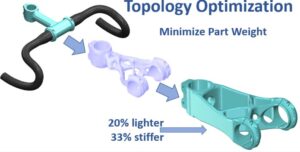Table of Contents
Table of Contents
Introduction
 (FEA) is a powerful engineering tool used to analyze and simulate the behavior of complex structures and systems. Finite Element Analysis Services refer to the specialized services offered by companies or providers that utilize FEA techniques to solve engineering problems. Because of the experience required to get reliable FEA results, these services are commonly outsourced by industries such as aerospace, automotive, and manufacturing, among others to experienced FEA service providers.
(FEA) is a powerful engineering tool used to analyze and simulate the behavior of complex structures and systems. Finite Element Analysis Services refer to the specialized services offered by companies or providers that utilize FEA techniques to solve engineering problems. Because of the experience required to get reliable FEA results, these services are commonly outsourced by industries such as aerospace, automotive, and manufacturing, among others to experienced FEA service providers.
FEA services involve the use of computer software to create a virtual model of a physical object or system. This model is then divided into smaller, finite elements, which are interconnected at specific points called nodes. By applying mathematical equations and algorithms, FEA software can simulate the behavior of the object or system under various conditions, such as stress, heat transfer, fluid flow, and vibration.
The primary goal of FEA services is to provide accurate and reliable predictions of how a structure or system will perform in real-world scenarios. This information is crucial for engineers and designers to make informed decisions during the design and development stages of a project. By identifying potential issues or weaknesses early on, FEA can help optimize designs, reduce costs, and improve overall performance and safety.
FEA services can encompass a wide range of applications, including structural analysis, thermal analysis, fluid dynamics, and electromagnetic analysis. Providers of FEA services typically offer a variety of specialized services tailored to meet the specific needs of different industries and projects. At Situs Engineering we focus on using structural analysis, thermal analysis, and computational fluid dynamics to evaluate mechanical components and systems.
This article discusses the purpose and significance of FEA in engineering and highlights the role of FEA services in solving complex engineering problems. The article will delve into the benefits, applications, types of services, expertise of providers, pricing considerations, and other relevant aspects of Finite Element Analysis Services.
Benefits of Finite Element Analysis Services in Various Industries
Finite Element Analysis (FEA) is a powerful tool that has revolutionized the way industries approach design and engineering. By simulating real-world conditions and analyzing the behavior of complex structures, FEA provides valuable insights that can lead to improved product performance, reduced costs, and enhanced safety. In this section, we will explore some of the key benefits of FEA in various industries.
One of the primary advantages of FEA is its ability to optimize designs. By subjecting virtual prototypes to different loads and conditions, engineers can identify weak points and areas of stress concentration. This allows them to make informed design modifications early in the development process, resulting in more robust and efficient products. For example, in the automotive industry, FEA can be used to optimize the design of car frames, ensuring they meet safety standards while minimizing weight and material usage.
FEA also enables engineers to predict and prevent failures. By analyzing stress, strain, and deformation, FEA can identify potential failure points before they occur in real-world scenarios. This proactive approach helps prevent costly and potentially dangerous failures, particularly in industries such as aerospace and manufacturing, where the consequences of failure can be catastrophic.
Another benefit of FEA is its ability to reduce the need for physical prototypes. By simulating and testing designs virtually, companies can save time and money on prototype production and testing. This is particularly advantageous in industries with long development cycles, such as the construction and energy sectors. FEA allows engineers to iterate and refine designs quickly, accelerating the product development process.
FEA also plays a crucial role in ensuring regulatory compliance. Industries such as healthcare and pharmaceuticals must adhere to strict regulations and standards. FEA can help validate designs and ensure they meet regulatory requirements, reducing the risk of non-compliance and potential legal issues.
Finite Element Analysis offers numerous benefits across various industries. From optimizing designs and preventing failures to reducing costs and ensuring regulatory compliance, FEA is a valuable tool for engineers and designers. By leveraging the power of FEA, companies can improve product performance, enhance safety, and gain a competitive edge in the market.
Understanding the Applications of Finite Element Analysis
Finite element analysis (FEA) is a powerful engineering tool that is widely used in various industries for solving complex problems and optimizing designs. Understanding the applications of FEA can help businesses and individuals leverage its capabilities to improve their products and processes.
(FEA) is a powerful engineering tool that is widely used in various industries for solving complex problems and optimizing designs. Understanding the applications of FEA can help businesses and individuals leverage its capabilities to improve their products and processes.
One of the key applications of FEA is in structural analysis. It allows engineers to simulate and analyze the behavior of structures under different loading conditions. This helps in identifying potential weaknesses, optimizing designs, and ensuring the structural integrity of buildings, bridges, and other infrastructure projects.
FEA is also extensively used in the manufacturing industry for the design and analysis of components and systems. By simulating real-world conditions, FEA helps improve safety, reduce weight, and enhance overall performance.
FEA is also utilized in the manufacturing industry for process and product optimization and quality control. It helps in simulating products in their actual application to identify potential failures. By predicting the behavior of products, FEA enables manufacturers to improve product quality and performance before money is spent on expensive tooling.
FEA also finds applications in a wide range of fields, including electronics, medical devices, energy, automotive, and consumer products. It can be used for analyzing heat transfer, fluid flow, electromagnetic fields, and many other physical phenomena.
Overall, understanding the applications of FEA can help businesses and individuals harness its capabilities to solve complex engineering problems, optimize designs, and improve product performance. By partnering with expert providers of finite element analysis services, companies can leverage this powerful tool to gain a competitive edge in their respective industries.
Types of Services Offered in Finite Element Analysis
When searching for finite element analysis services, it is important to understand the different types of services that providers offer. This section will provide an overview of the common types of services offered in finite element analysis.
- Structural Analysis: This type of analysis focuses on evaluating the structural integrity and performance of a component or system. It involves analyzing factors such as stress, strain, deformation, fatigue, buckling, and other failure modes. Structural analysis is commonly used in the manufacturing industry to understand product performance before spending time and money on prototypes.
- Thermal Analysis: Thermal analysis involves studying the heat transfer and temperature distribution within a component or system. It helps in understanding how temperature affects the performance and reliability of a design. Thermal analysis is crucial in industries such as electronics, power generation, and HVAC.
- Fluid Flow Analysis: This type of analysis is used to study the behavior of fluids, such as liquids or gases, within a system. It helps in analyzing factors such as pressure, velocity, and turbulence. Fluid flow analysis is commonly used in industries such as aerospace, automotive, and oil and gas. At Situs Engineering, our computational fluid dynamics (CFD) experts use SolidWorks Flow software to assist engineers in visualizing and fully understanding the flow characteristics of their systems.
- Electromagnetic Analysis: Electromagnetic analysis focuses on studying the interaction between electromagnetic fields and components or systems. It helps in analyzing factors such as electromagnetic interference, electromagnetic compatibility, and electromagnetic radiation. Electromagnetic analysis is important in industries such as electronics, telecommunications, and renewable energy.
 Optimization and Design Validation: In addition to analysis, many finite element analysis service providers also offer optimization and design validation services. These services help in improving the performance, efficiency, and reliability of a design by identifying areas for improvement and suggesting design modifications. See my blog article on Topology Optimization to learn more about the optimization services offered by Situs Engineering.
Optimization and Design Validation: In addition to analysis, many finite element analysis service providers also offer optimization and design validation services. These services help in improving the performance, efficiency, and reliability of a design by identifying areas for improvement and suggesting design modifications. See my blog article on Topology Optimization to learn more about the optimization services offered by Situs Engineering.
When choosing a provider for finite element analysis services, it is important to consider the specific types of services they offer and whether they align with your industry and project requirements. Additionally, it is crucial to assess the provider’s expertise and experience in delivering these services to ensure accurate results and reliable analysis.
Expertise and Experience of Finite Element Analysis Service Providers
When searching for finite element analysis services, it is crucial to consider the expertise and experience of the providers. Finite element analysis is a complex and specialized field that requires a deep understanding of engineering principles and simulation techniques. Therefore, it is essential to choose a provider who has the necessary expertise and experience to deliver accurate and reliable results. Are they licensed professional engineers? Are they certified to use the FEA software they are using?
Expertise in finite element analysis involves a thorough understanding of the underlying theory and principles of the method. Providers should have a strong background in engineering, structural mechanics, heat transfer, fluid dynamics, and other relevant disciplines. They should also be proficient in using finite element analysis software and have experience in applying it to various engineering problems.
Experience is equally important when it comes to finite element analysis services. Providers with years of experience have likely encountered a wide range of engineering challenges and have developed effective strategies to solve them. They have a deep understanding of the limitations and assumptions of the method and can provide valuable insights and recommendations based on their past projects.
It is important to choose an FEA service provider that understands the limitations of FEA. At Situs Engineering we understand that the results are only as good as the assumptions being made, the boundary conditions used, and the setup of the analysis. With our years of experience, we understand the limitations of FEA and always lean towards underpromising and overdelivering, and we know what our software can and cannot do.
Choosing a provider with the right expertise and experience in finite element analysis can significantly impact the quality and reliability of the results. It ensures that the analysis is conducted using the appropriate techniques and models, leading to accurate predictions and recommendations. Moreover, experienced providers can offer valuable insights and recommendations based on their past projects, helping you make informed decisions for your engineering designs and optimizations.
In conclusion, when searching for finite element analysis services, it is crucial to consider the expertise and experience of the providers. Look for providers with a strong background in engineering and a proven proficiency in the finite element analysis software they are using. Their expertise and experience will ensure accurate and reliable results, as well as valuable insights and recommendations for your engineering needs.
Pricing and Cost Considerations
When considering finite element analysis services, one important factor to consider is the pricing and cost associated with these services. The cost of finite element analysis can vary depending on several factors, including the complexity of the analysis, the size of the project, and the expertise and experience of the provider.
It is important to note that finite element analysis is a specialized field that requires advanced knowledge and skills. As such, the cost of these services may be higher compared to other types of engineering or analysis services. However, the accuracy and reliability of the results obtained through finite element analysis make it a worthwhile investment for many industries.
Providers of finite element analysis services typically offer different pricing models to accommodate the needs and budgets of their clients. Some providers may charge an hourly rate, while others may offer fixed pricing for specific types of analysis or projects. It is important to discuss pricing options with potential providers to ensure that they align with your budget and project requirements.
In addition to the cost of the analysis itself, it is also important to consider any additional costs that may be associated with finite element analysis services. This may include the cost of software licenses, hardware requirements, and any additional support or consulting services that may be needed.
When comparing pricing options from different providers, it is important to consider the expertise and experience of the providers. While cost is an important factor, it should not be the sole determining factor in choosing a provider. It is important to choose a provider that has a proven track record of delivering accurate and reliable results, as well as a deep understanding of the specific industry and application of finite element analysis.
In conclusion, pricing and cost considerations are important aspects to consider when seeking finite element analysis services. It is important to find a provider that offers competitive pricing options while also ensuring the expertise and experience necessary to deliver accurate and reliable results. By carefully considering these factors, businesses can leverage finite element analysis services to drive success and innovation in their respective industries.
How to Choose the Right FEA Service Provider
 When it comes to choosing the right provider for finite element analysis services, there are several factors to consider. Making the right choice is crucial as it can greatly impact the accuracy and reliability of the analysis results, as well as the overall success of your project. Here are some key considerations to keep in mind:
When it comes to choosing the right provider for finite element analysis services, there are several factors to consider. Making the right choice is crucial as it can greatly impact the accuracy and reliability of the analysis results, as well as the overall success of your project. Here are some key considerations to keep in mind:
- Expertise and Experience: Look for providers who have a strong background in finite element analysis and a proven track record of delivering accurate results. Consider their experience in your specific industry or application to ensure they have the necessary knowledge and understanding of your unique requirements.
- Range of Services: Evaluate the types of services offered by the provider. Do they offer a comprehensive range of finite element analysis services that align with your project needs? It’s important to choose a provider that can handle all aspects of the analysis, from pre-processing and meshing to post-processing and interpretation of results.
- Technology and Tools: Consider the software and tools used by the provider. Are they up-to-date with the latest advancements in finite element analysis technology? Does the FEA software integrate well with the CAD software used to design the product?
- Communication and Collaboration: Effective communication and collaboration are essential for a successful partnership. Choose a provider who is responsive, proactive, and willing to work closely with you throughout the analysis process. This ensures that your specific requirements are understood and met. At Situs Engineering, we have a reputation for focusing on collaboration with our clients rather than focusing on contract negotiation which unfortunately seems to becoming more common these days.
- Pricing and Cost: While cost should not be the sole determining factor, it is important to consider the pricing structure and whether it aligns with your budget. Request quotes from multiple providers and compare them based on the services offered and the value they provide.
By carefully considering these factors, you can make an informed decision and choose the right provider for your finite element analysis services. Remember, investing in a reputable and experienced provider will ultimately lead to more reliable results and better outcomes for your project.
Conclusion: Leveraging Finite Element Analysis Services for Business Success
In the world of engineering and design, finite element analysis (FEA) has become an essential tool for ensuring the success and efficiency of various projects. By simulating and analyzing the behavior of complex structures and systems, FEA helps businesses make informed decisions, optimize designs, and reduce costs. In this conclusion section, we will discuss the importance of leveraging finite element analysis services for business success.
One of the key takeaways from this article is the expertise and experience of providers in finite element analysis. When choosing a provider, it is crucial to consider their track record, qualifications, and industry reputation. By partnering with an experienced and trusted provider, businesses can ensure accurate results and industry-leading expertise, ultimately leading to better project outcomes.
Another important consideration is the types of services offered in finite element analysis. Providers may offer a range of services, including structural analysis, thermal analysis, fluid flow analysis, and more. Understanding the specific needs of your business and finding a provider that offers tailored services can greatly enhance the effectiveness of finite element analysis in your projects.
Pricing and cost considerations are also crucial when it comes to leveraging finite element analysis services. While it is important to find a provider that offers competitive pricing, it is equally important to consider the value and quality of the services provided. Investing in high-quality finite element analysis services can lead to significant cost savings in the long run by identifying potential design flaws or inefficiencies early on.
Furthermore, the reviews and testimonials from previous clients can provide valuable insights into the capabilities and reliability of a finite element analysis service provider. Taking the time to research and read about the experiences of others can help businesses make informed decisions and choose the right provider for their specific needs.
In conclusion, leveraging finite element analysis services can greatly contribute to the success of businesses in various industries. By partnering with expert providers, businesses can benefit from accurate results, industry-leading expertise, and optimized designs. Considering factors such as the types of services offered, expertise and experience of providers, and pricing can help businesses make the right choice and maximize the benefits of finite element analysis for their projects.

